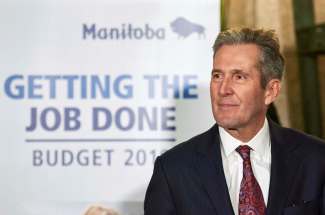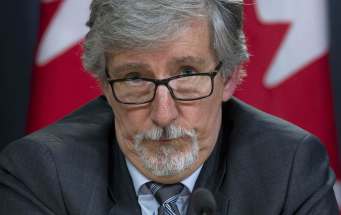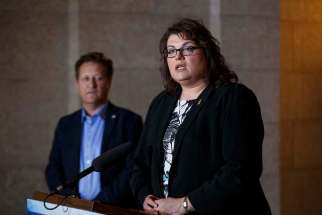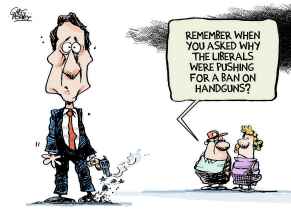Brian Pallister continues to tick the boxes on election-prep list But fixes to some problem areas opening him up to fresh criticism
Read this article for free:
or
Already have an account? Log in here »
To continue reading, please subscribe:
Monthly Digital Subscription
$0 for the first 4 weeks*
- Enjoy unlimited reading on winnipegfreepress.com
- Read the E-Edition, our digital replica newspaper
- Access News Break, our award-winning app
- Play interactive puzzles
*No charge for 4 weeks then price increases to the regular rate of $19.00 plus GST every four weeks. Offer available to new and qualified returning subscribers only. Cancel any time.
Monthly Digital Subscription
$4.75/week*
- Enjoy unlimited reading on winnipegfreepress.com
- Read the E-Edition, our digital replica newspaper
- Access News Break, our award-winning app
- Play interactive puzzles
*Billed as $19 plus GST every four weeks. Cancel any time.
To continue reading, please subscribe:
Add Free Press access to your Brandon Sun subscription for only an additional
$1 for the first 4 weeks*
*Your next subscription payment will increase by $1.00 and you will be charged $16.99 plus GST for four weeks. After four weeks, your payment will increase to $23.99 plus GST every four weeks.
Read unlimited articles for free today:
or
Already have an account? Log in here »
Hey there, time traveller!
This article was published 03/05/2019 (2417 days ago), so information in it may no longer be current.
Premier Brian Pallister has a list, and he’s checking it twice, but unlike Santa Claus, he’s not trying to determine who’s naughty or nice; he’s trying to eliminate all impediments to an early election call.
For several months now, Pallister has unleashed a series of half-cooked half-measures that are strategically, if not a little awkwardly, aimed at plugging the chinks in his political armour.
To ensure no one could accuse him of ignoring the plight of impoverished Manitobans, Pallister released in March a hastily prepared, threadbare anti-poverty strategy. Entitled Pathways to a Better Future, the document was 15 months overdue and clearly out of date. Anti-poverty activists and social service providers were unimpressed.
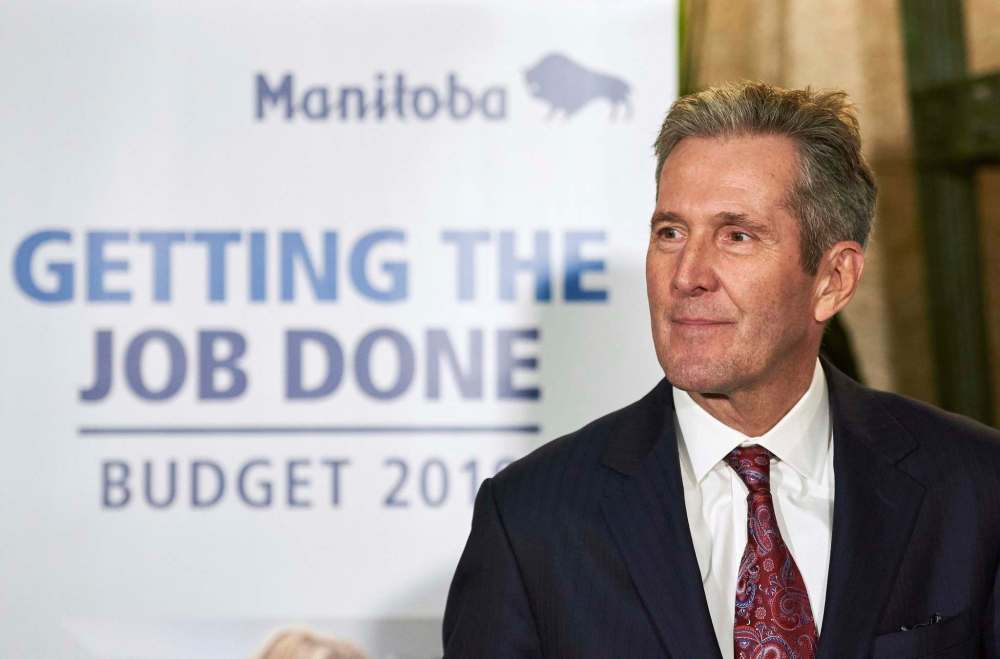
“It’s a strategy without its essential bones,” said Sid Frankel, a University of Manitoba social work professor.
Then, in early April came the vaunted launch of the province’s new Economic Development Office. The EDO is supposed to breathe life into the premier’s Economic Growth Action Plan which, like the anti-poverty strategy, has been lauded repeatedly by the premier but has no concrete elements.
This past week, we saw efforts made to check off two more boxes on the premier’s list of things he must do before launching an election that almost nobody wants.
First, it was the release of a report by Winnipeg lawyer Michael Green, who was retained to study changes to laws on government advertising. In a surprise turn of events, we discovered Green was allowed to review a new and previously unseen bill that would completely change the rules for how and when a government can advertise, including in the sensitive pre-writ period.
Right now, one of the biggest hurdles standing in Pallister’s way of an early election is the 90-day blackout on government advertising before an election. The current law does include a loophole that allows a government to ignore the blackout period if an early election is called; however, that provision has never been tested and Pallister is vulnerable to attack for ignoring a law meant to ensure fairness in provincial general elections.
The proposed bill tucked into the appendix of the Green report on government advertising has no blackout period prior to an election. Given that the original 90-day blackout was a Tory creation — adopted by the NDP in 2006 as a concession to the opposition to ensure timely passage of legislation — this is a backhanded way of going about a major change in the laws governing fair elections in this province.
The next box to be checked on Pallister’s list — perhaps the final box? — was the surprising announcement late this week that his government is re-thinking the closure of the Concordia Hospital emergency department.

Health Minister Cameron Friesen announced on Thursday he will take a step back and re-assess the closure of Concordia ER. Dr. David Peachy, the consultant who first proposed the plan to cut the number of ERs in Winnipeg from six to three, will conduct a “quality assurance assessment” before any action is taken.
Friesen wouldn’t commit to keeping the ER open, but neither would he fully commit to closing it as scheduled. He also suggested that at the very least, the closure could be delayed.
In the context of an early election, Friesen’s strategy is transparent. One need only look at the dozens of Keep Concordia Open signs that line Henderson Highway to understand that it’s a top-of-mind issue for voters there.
How surprising was this announcement? Earlier in the same week, the WRHA confirmed to the Free Press that the plan to close Concordia ER was on track for late June, and work at the St. Boniface Hospital to expand its ER, in large part to handle increased patient volumes created by the closure of ERs at Concordia and (in September) Seven Oaks hospitals, was “on time and under budget.”
Given that the WRHA made no mention of a possible delay, Friesen’s announcement has the appearance of a last-minute, last-ditch effort to defuse Concordia as an election issue. The decision to delay or reverse the closure may not make re-election any more difficult, but this announcement is certainly not going to make it easier, either.
When you add all these things together, what becomes apparent is a troubling propensity by the current government to promote half-measures as solutions to complex problems.
When you add all these things together, what becomes apparent is a troubling propensity by the current government to promote half-measures as solutions to complex problems.
The government does have significant accomplishments to celebrate, the kinds of things that can theoretically form the foundation of a solid re-election campaign. The deficit has gone down significantly under their watch, the result of a rigorous oversight on expenditures, and the provincial sales tax has been reduced to seven per cent, fulfilling Pallister’s principal pledge from the 2016 campaign.

Beyond that, the results are mixed. Provincial civil servants are angry about a wage freeze imposed on them by sheer force of will. The construction industry is fuming about a dramatic reduction in government investment in infrastructure. Social services, health and education have all had to tighten their belts to deal with Pallister’s austerity, and frontline services are suffering.
If he calls an early election, Pallister will be telling both his own party and voters in general that he sees no immediate threat to a second mandate; however, a comparison of the political landscape in 2016, when Pallister won a thunderous majority, with the one that faces him now should be cause for concern.
In the 2016 election, voters were more motivated to reject and punish the NDP than to embrace the Tories. The PC platform featured few signature pledges outside of Pallister’s long-standing promise to cut the PST. He promised to slow the growth in government spending with no impact on front-line services.
Pallister knew he didn’t have to promise much because the NDP had suffered a fatal, self-inflicted wound from the 2015 civil war that saw five cabinet ministers resign over then-premier Greg Selinger’s refusal to step down.
As for the Liberals, their leader at the time, Rana Bokhari, had started strong but ultimately succumbed to her party’s tradition of underperformance.
In other words, it was an election Pallister could not lose.
The irony is that every time Pallister tries to remove an impediment to re-election– the things that would make an early election call somewhat perilous — he actually ratchets up the level of risk.
In 2019, it remains hard to see the Tories losing. Still in rebuilding mode and poorly resourced, neither the NDP or the Liberals are poised to form government; however, both parties are starting to believe they can inflict some meaningful damage to the Tory juggernaut.

Their growing confidence can be attributed to problems Pallister cannot shed with hasty, empty promises or a hollow studies: the hospital reorganization, growing waiting lists for elective surgeries, the imposed wage freeze on civil servants, the gutting of infrastructure spending and the willingness to ignore legal provisions designed to ensure fair elections.
The irony is that every time Pallister tries to remove an impediment to re-election — the things that would make an early election call somewhat perilous — he actually ratchets up the level of risk.
If Pallister follows the precedent set by successful political leaders facing the same decision, the final box on his pre-election list should be a no-brainer: “Whatever you do, don’t screw this up.”
dan.lett@freepress.mb.ca

Born and raised in and around Toronto, Dan Lett came to Winnipeg in 1986, less than a year out of journalism school with a lifelong dream to be a newspaper reporter.
Our newsroom depends on a growing audience of readers to power our journalism. If you are not a paid reader, please consider becoming a subscriber.
Our newsroom depends on its audience of readers to power our journalism. Thank you for your support.

